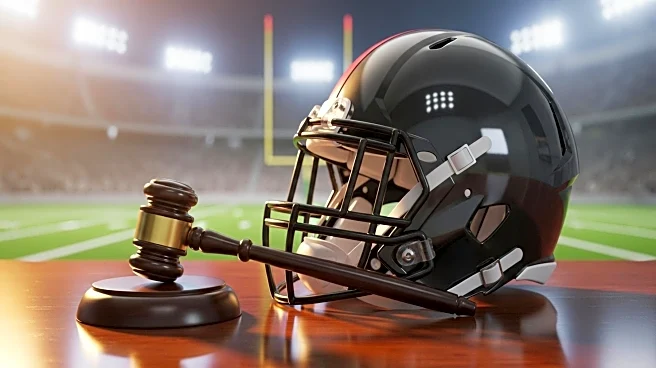What's Happening?
A Texas judge has ruled in favor of Indiana starting safety Louis Moore, granting him eligibility to continue playing for the Hoosiers this season. Moore challenged the NCAA's five-year eligibility rule, arguing that his three years at Navarro Junior College should not count against his eligibility. The lawsuit, filed in August, was similar to one brought by Vanderbilt quarterback Diego Pavia. Judge Dale Tillery ruled that the NCAA's eligibility rule violated the Texas Antitrust Act. The court's temporary injunction order emphasized the immediate need for Moore to play football for Indiana to prevent irreparable harm to his career, including development with the team and opportunities related to his NIL deal. Moore leads Indiana with 23 tackles and two interceptions this season, marking his seventh year of college football.
Why It's Important?
The ruling is significant as it challenges the NCAA's eligibility rules, potentially setting a precedent for other student-athletes in similar situations. This decision could impact the NCAA's governance and its approach to eligibility criteria, especially concerning junior college transfers. For Moore, the ruling allows him to continue his football career and pursue opportunities related to his name, image, and likeness (NIL) deals, which are increasingly important for college athletes. The decision also highlights ongoing legal challenges to NCAA policies, which could lead to broader reforms in college athletics.
What's Next?
The NCAA may need to reassess its eligibility rules in light of this ruling, potentially leading to changes that accommodate junior college transfers more favorably. Other student-athletes might be encouraged to challenge similar eligibility restrictions, leading to further legal scrutiny of NCAA policies. Indiana Football will benefit from Moore's continued participation, enhancing their defensive capabilities as they aim for the College Football Playoff.
Beyond the Headlines
This case underscores the growing influence of NIL deals in college sports, as athletes seek to maximize their earning potential while still in school. The legal victory for Moore could inspire more athletes to pursue legal action against perceived injustices in NCAA regulations, potentially leading to a more athlete-friendly environment in college sports.









